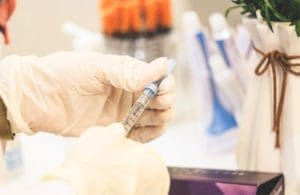
(Image by Sam Moqadam on Unsplash)
Once enough people receive effective vaccines against the novel coronavirus, experts say, the end of the pandemic may be in sight. But a new poll of older adults — one of the highest-priority groups for vaccination — suggests an uphill climb lies ahead to reach that goal.
In all, 58% of adults aged 50 to 80 say they are somewhat or very likely to get vaccinated to prevent COVID-19, according to new results from the National Poll on Healthy Aging from the University of Michigan. The poll was taken in October, before efficacy data from Pfizer/BioNTech and Moderna came out.
That number went up to 66% when the poll team asked the question a different way: 20% said they’d want to get vaccinated right away when vaccines become available, but 46% said they’d rather wait for others to get vaccinated first before doing it themselves.
Other, separate surveys taken in September and October showed that even healthcare workers need convincing to get a coronavirus vaccine, according to UBS. Results of a survey conducted in September and October suggested only 63% of healthcare providers would get a COVID-19 vaccine. An October survey of nurses revealed suggested that only 34% would get the vaccine, while 57% were comfortable discussing COVID-19 vaccines with patients.
Polls taken after the most recent vaccine news was published indicated noted some attitudes were changing, UBS said in a research note. The U.S. Centers for Disease Control & Prevention noted that 71% of more recent poll respondents viewed COVID-19 vaccines as effective and 68% believe them to be safe. The FDA has not granted emergency use authorization to any COVID-19 vaccine.

(Image courtesy of the University of Michigan)
In the University of Michigan survey, women, people of color, people between 50 and 64 years old, and those with lower incomes and education levels were less likely to say they’d seek vaccination in general. Only 40% of older adults who are Black, and 51% of those who are Hispanic, said they are somewhat or very likely to get vaccinated, despite the greater risk of hospitalization and death for members of these groups if they develop COVID-19.
People over age 65, whites, men and those with higher levels of education were more likely than others to say they’d want to get vaccinated right away. One-quarter of respondents said they’d consider taking part in a vaccine clinical trial.
The university’s Institute for Healthcare Policy and Innovation conducted the poll with support from AARP and Michigan Medicine, the university’s academic medical center. It draws from the answers of a nationally representative sample of 1,556 adults aged 50 to 80 who answered a wide range of questions online, according to the university. Laptops and internet access were provided to poll respondents who did not already have them.
“Effective vaccines will be crucial to getting this pandemic under control and preventing serious illness and death from COVID-19, especially among people over 50 and those with underlying health issues,” said poll director Dr. Preeti Malani, a specialist in geriatrics and infectious diseases at Michigan Medicine, in a news release. “Our findings point to a strong need to communicate effectively and transparently about how well the vaccines work, the safeguards built in to protect the safety of recipients, and the public health importance of widespread vaccination starting with priority groups.”
Key messengers and messages
Getting out the word about the efficacy of each vaccine will be paramount, the university poll suggests; 80% of respondents said that they’ll consider how well a vaccine works as part of making their vaccination decision.
Healthcare providers will also play a critical role in talking with older adults about the vaccine, according to poll results. Just over half of the older adults surveyed said their doctor’s recommendation would be very important to their decision about vaccination. Just over 40% called recommendations from public health officials very important.
More than half of the respondents said their own research into the information available about COVID-19 vaccines will factor into their decisions. That makes it important for the news media, government, vaccine makers, health organizations, hospitals and nonprofits to share easily understandable and accurate information about vaccines, according to Malani.
This includes sharing information about any issues spotted in clinical trials, and about the safeguards in place during vaccine development. Nearly half of poll respondents said they worry about the safety of a rapidly developed vaccine.
One factor that didn’t seem to make a difference in a person’s inclination to be vaccinated against COVID-19 was their personal experience with the disease, either in themselves or someone they know.
Just over half of poll respondents knew someone who had had COVID-19, and 2% said they’d been infected themselves. Nearly one in five said they knew someone who had died of COVID-19, but members of these groups were no more likely to say they’d get vaccinated.
Messaging about the cost of vaccine for consumers also appears to be important. Nearly one-third of respondents said cost was very important to their decision about vaccination.
“Any coronavirus vaccine must be FDA-authorized or approved, safe, effective and accessible. Once vaccines are available, it will be important for Americans to talk to their providers to understand which vaccine is best for them and make an informed choice, and for public health officials to monitor uptake and the impact on community health,” said AARP SVP for research Alison Bryant. “AARP is urging the government to be transparent about the development and authorization or approval process for any vaccines. It is also important to engage higher-risk groups, hear their concerns, and work to address them honestly and with sensitivity.”
Reaching those who are on the fence about vaccination — including the 14% who are unsure, and the 11% who are somewhat unlikely to get vaccinated — will also be important, Bryant said.
More findings
Most University of Michigan poll respondents appear to agree with recommendations from public health authorities that getting a flu shot and prioritizing COVID-19 vaccine for the highest risk members of society are both good ideas.
Nearly three-quarters of respondents said they had already gotten vaccinated against the flu, or intended to. Nearly half said it was more important to get a flu shot this year than previously.
Nearly all respondents (93%) agreed it’s important to prioritize giving COVID-19 vaccines to high-risk individuals. Older adults, those who work directly with the public in healthcare and other professions, and people with underlying health conditions and weak immune systems, have all been identified as possible priority groups.
You can read the full report of the findings and methodology here.
Filed Under: Drug Delivery, Infectious Disease




The fact that healthcare workers presented low numbers for vaccine acceptance is not a new phenomenon. My wife has worked as an RN and director of nursing for many years, and she always noticed that doctors and nurses who were patients were almost unanimously not taking vaccines, and staying off prescriptions as much as possible. These are the people who are seeing all the negative effects of vaccines, and under pressure from their institutions are not saying anything. But the proof is in the pudding when it comes to what they will do to themselves.
Dr. Malani can make a statement that vaccines are the answer, and most people will just follow that. But this totally undermines the idea that the body’s own immune system needs to, and can do, its own work naturally. Its as if we believe that the human immune system is flawed, and unless we step in with something artificial and disrupt the natural system, we will all die. This is not true. And all for a virus that has staggering low death rates that would have come and gone already if our society would not have tried to step in and intervene with its artificial methods.
If Dr. Malani’s concern is for the elderly, perhaps she should have considered supporting a position of letting this virus pass and sweep through quickly like the seasonal flu, while quarantining the sick and elderly to protect them. Instead, our society has chosen to do the worst thing possible: interfere with artificial methods to interrupt the natural cycle and extend the situation longer that it needed to be, making it much harder for the sick and elderly to avoid it. In its attempt to help, our society has chosen to do the exact opposite and make things worse, all because it has an attitude that we are smarter than nature and need to inflict artificial means upon the body and its natural processes to protect ourselves.
I think everyone would benefit from doing a bit of studying at the RealImmunity library at https://realimmunity.org/